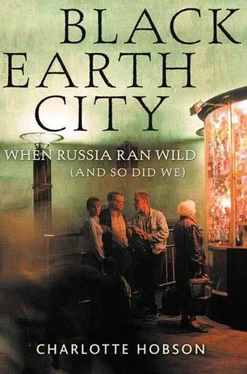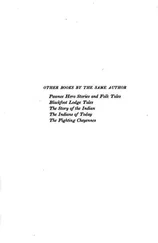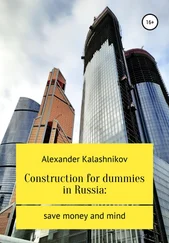“How do any of us survive?” he replied, shrugging. “Habit, I suppose.”
It’s rare, I suspect, for people to come to Russia in search of moderation. When I arrived my head was stuffed so full of preposterous excesses that it made my eyes bulge. I’d read, for instance, that during the reign of Nicholas II, so many jewels were pouring out of Siberia that the courtiers were not content with mere necklaces. Collars, belts, whole breastplates made of diamonds became the fashion. In the nineteenth century, the Tolstoys were so particular about their laundry that they sent it to be washed in Holland. As 1917 unraveled, the last aristocrats in the Empire washed their hair in champagne and danced barefoot in troughs of caviar. A few months later most of them were penniless or dead, but the attitude lived on. As late as 1982, the Communist Party leader in Azerbaijan, Geidar Aliyev, built an entire palace for a visit by Brezhnev. Aliyev also presented him with a monstrous ring, which consisted of one large jewel (representing the Soviet Union) surrounded by fifteen smaller ones (the republics). Brezhnev stayed for the weekend; the palace was not used again.
Yakov had inherited something of this spirit, I’ve no idea where from. In the New Year he and Nina parted ways. Nina had grown tired of listening to Yakov improvise on his guitar, and Yakov had begun to look hunted. He became very thin and seemed to develop a horror of physical contact. One evening I caught an expression of disgust on his face as he glanced down at her hand holding his. They agreed to end the affair and Yakov did not visit the hostel for some weeks. Nina was a phlegmatic girl, and the entire episode—the turbulent opening scenes, the anguish, though short-lived, of her friend Liza Minnelli, and the anticlimactic end—barely impinged on her manner of faintly vacuous cheer. Soon the three girls in Room 99 were lolling in bed together until afternoon, drinking tea, and stubbing cigarettes out in old beer cans, as good friends as ever. Yakov, however, seemed badly shaken.
The next time I saw him it was three o’clock on a chill February morning and he was leaning over my bed, shaking me by the shoulder. Emily and Ira slept on.
“Come down to the station with me. I want to show you something.”
I sat up. “What—”
“Come on, let’s go to the station.” He was trembling. The half-light from the corridor emphasized his thinness, his puffy eyes.
“OK, let me get dressed.” It occurred to me that I’d rather he did not go down to the station alone. He had an air of urgency that felt dangerous.
Yakov and I walked out into the black, glittering street. The temperature was a steady ten degrees below and the wind had fallen. At night, the ice seemed to have compelled the whole world, even the clouds far above, to be still. Only the breath rising from our lips like blue feathers defied it.
Yakov led me through the station and up the iron stairs of a bridge spanning the tracks. I clattered behind him. He hadn’t spoken since we left the hostel. Now he stopped halfway across the bridge, panting, and waited. It was a fine, solid Soviet construction, covered, with sides five feet high and crisscross wire netting stretched above, so no one could come to harm on the tracks. Where we stood, a long jag in the wire had been cut open and the loose section bounced gently, shaken by our footsteps. I waited with Yakov, watching him out of the corner of my eye. We were both shivering.
A flashlight was wavering toward us along the rails; the ringing note of iron against iron identified the figure as a signalman, checking the points. He drew closer and I saw him puffing as he walked, bending and swinging his hammer rhythmically.
“That must be a lonely life,” I remarked to break the silence.
I struck a nerve. Yakov responded in a high, wobbly voice. “Yes, you know I work and I study… struggle to do the best for everyone… and the whole world is running and no one has time… even my mother hardly speaks to me these days… and all these people, my friends, these girls—they all want something from me and I’m exhausted… given my heart and yet rejected…”
“But Yakov, what do you mean? You haven’t been to visit us lately, we thought you must be too busy. I heard you were working?”
“I have been! Working like a madman, and yet what comes of it but problems, awkwardnesses?” Yakov paced back and forth. He was very pale, on the verge of tears. “You know what, if this was a stage and down there”—he gestured at the tracks—“down there ten thousand people— ten thousand —were waiting and watching, you know what I’d say to them?” He expanded his chest. “I would stand here, and I would say, ‘None of you, not a single one of you, understands me!’”
There was a pause. After a moment I couldn’t help myself; a bubble of laughter rose in my throat. “Come on,” I said hurriedly. “We are your friends, dear Yakov, whatever you think. Let’s go back. It’s too cold.”
Yakov nodded, deflated. He left me at the door of the hostel and went home.
A few days later I heard the whole story. The Salvation Army was setting up a branch in Voronezh and for some reason they had employed Yakov to install their telephone system. Why, the Lord only knows: Yakov was a mysterious answer to their prayers. He was hardly an electrician, although that was not the real problem.
The awkwardness emerged when the Salvation Army called Yakov in and spread half a million rubles on the table before him. Money for equipment, they told him. No doubt they arranged a date by which the system needed to be ready. Perhaps they suggested convenient times for installation, when the office would be empty. Being Christian soldiers, uninterested in money, they did not notice the expression on Yakov’s face as he gazed at half a million rubles in brand-new notes. He’d never seen so much cash before. He pocketed it and walked out of the building in a daze. Nina and he were no longer together, but he’d met a girl the week before, a beautiful girl, she’d been on his mind ever since. She’d been visiting Voronezh, but now she was back in her home in Minsk. Yakov found himself down by the station. Minsk, Minsk—there was a train in several hours. Ah, to hell with it, he thought, and got in a taxi.
“Take me to Minsk,” he announced, spilling half a million rubles onto the leatherette seat. Then he fell asleep and dreamed he was swimming in warm water.
In Minsk, one thousand kilometers later, Yakov waited for some hours outside an empty apartment building. Late that night, the girl came home with her boyfriend. She was less than pleased to find Yakov and the taxi driver, who happened to be called Brezhnev, on her doorstep. She let them stay the night on her floor, however, and cooked them fried eggs in the morning.
“Pretty girl,” said Brezhnev approvingly, when they left the apartment after breakfast. “So, chief, time to go home?”
Four days after the meeting with the Salvation Army, Yakov arrived back in Voronezh. Brezhnev dropped him off at the station.
“Mind if I leave you here, boss? You’ve worn me out with this trip of yours. I’m going home. My wife’ll give me hell! She’ll never believe that I’ve been to Minsk… Oh, here’s your change, colonel. Take it and good health to you!” He pressed fifty thousand rubles into Yakov’s hand and drove away.
Apart from his late night visit, I didn’t see Yakov for a time. The Salvation Army was understanding, I heard, and even carried on employing him. Perhaps they saw him as a prodigal son, although Yakov was not repentant. As he saw it, he had been spreading love in the world. It was just that we did not understand.
The shelves in the Gastronom filled up a little, but I continued to feel dizzy and light-headed. After a couple of weeks Mitya arranged for me to see his doctor. The waiting room was full and silent; even the children were subdued. An old lady was crying as she talked to the receptionist. Now and again a sob broke from her, and she repeated, “He’ll kill me! If I go back, he’ll kill me!”
Читать дальше












